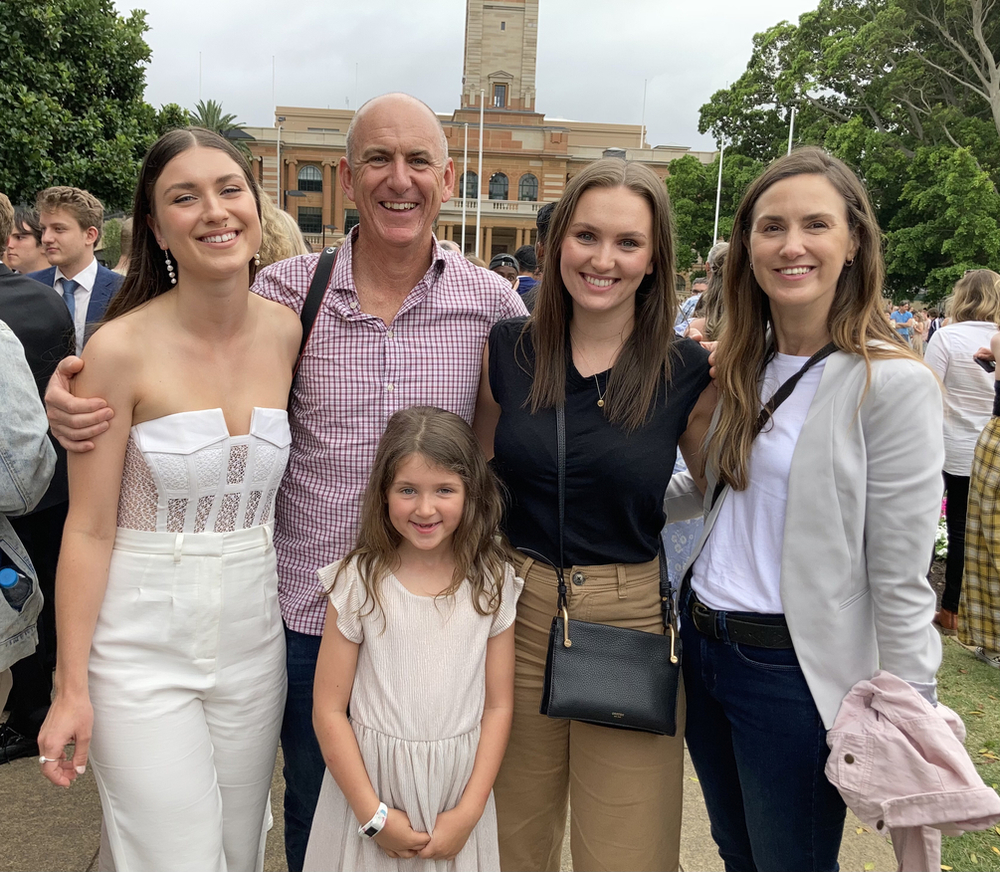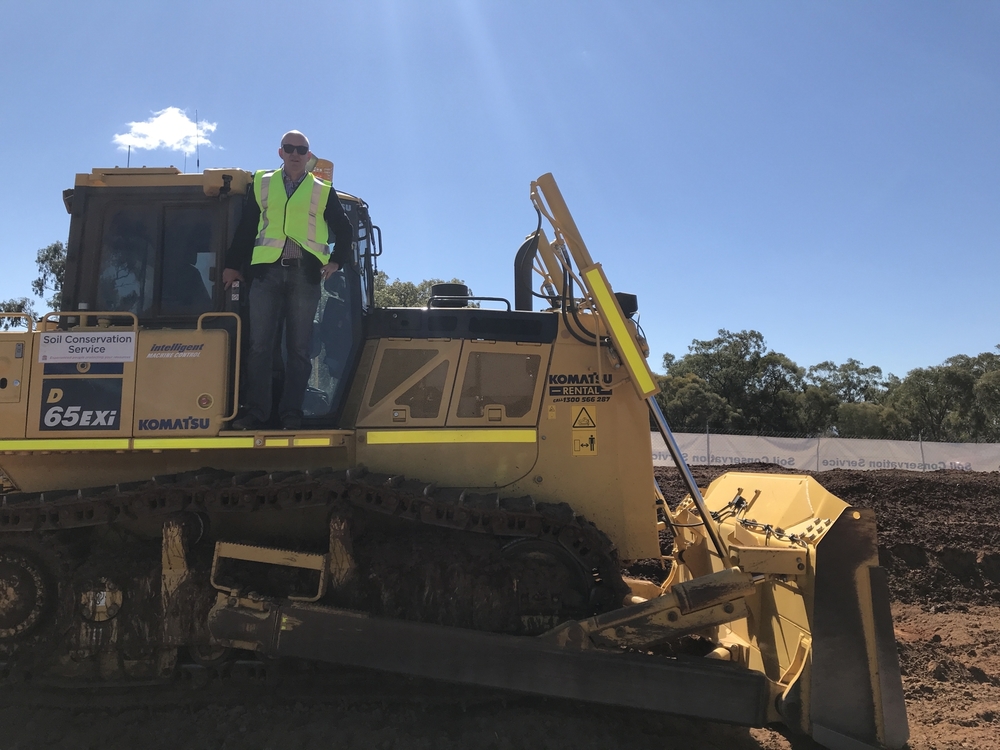Meet David Witherdin - NR's Reconstruction Corporation's top dog
Simon Mumford
24 April 2022, 4:29 AM
 CEO of the Northern Rivers Reconstruction Corporation David Witherdin
CEO of the Northern Rivers Reconstruction Corporation David WitherdinThis week the Premier announced the formation of the Northern Rivers Reconstruction Corporation (NRRC), the body that will lead the way forward with the recovery (along with Mal Lanyon) and importantly, the longer-term planning and rebuilding of our city.
David Witherdin is the man tasked with leading the NRRC. The Lismore App wanted to introduce you to David to give you a glimpse of who is and where he has come from.
David knows regional NSW very well having grown up on the mid-north coast in Forster and went to school at Forster High.
"We lived out of town in a small coastal community south of Forster and then my grandparents lived at Iluka, the mouth of the Clarence River in the late 80s. They have passed away in the last 5 years, but I spent a lot of time every year, I was always up there multiple times a year, I was fortunate to be very close to them."
"We would also spend some time around the Northern Rivers from my teens, going up to Lismore with my grandmother being one of the big shopping areas and then as they got older for medical appointments. I certainly have an affinity with the Northern Rivers area."

(David with his family from left Lara, Mia, Lucy and his wife Amber at Lara's formal. Photo: supplied)
David is based in Newcastle with his wife Amber (with a business advisory background now in the Aged Care industry) and three daughters Lucy (22 studying Law/Arts at Newcaslte Uni), Lara (19 studying Earth Science at Monash Uni in Melbourne) and Mia (8 in Year 3).
Most of David's work life has been state based roles across regional NSW.
"I've had teams everywhere from Tibooburra in the northwest of the state, down as far south as Bega in the south east so a lot of travelling and a lot of time on on ground."

(David at Agquip Gunnedah on a Soil Conservation Service bulldozer)
David came back into the public sector in 2013 as General Manager of the Soil Conservation Service.
"That was an organisation that was created in 1938 on the back of the dust bowl there to provide services and advice to landholders and was probably one of the first big pieces of environmental legislation of its kind. I was leading the Soil Conservation Service ever since as went from that into CEO of Local Land Services in 2017 and then that organisation sort of followed me as part of Local Land Services and as I stepped across into my new role leading Public Works came across with me again in January this year."
"So that's led by an Executive Director and a relatively small team of people, about 170 people across the stay, but doing really important environmental work there for government, for private landholders and sort of private businesses. We have staff currently in Grafton, Ballina, in Yamba so right across that area."
"Most recently the conservation team were doing all that coastal erosion control work on the beach there at Byron. So, a lot of work has been done in terms of rehabilitation on parts of the Clarence River and Richmond River so I sort of have that connection there over number years workwise."
Local Land Services was established in 2014, it has a regional focus through agriculture, biosecurity and natural resource management services across 11 geographic regions.
Over the last 5-years, David has led the organisation through drought, fires and more recently floods. The Lismore office at 79 Conway Street (just down from Aldi) went under on February 28 like many others. The Lismore Office was working with district vets on animal biosecurity, sale yards and other areas in the natural resource management space.
How does your background help you in this new role as CEO of the NRRC?
"I think it certainly gives me a good understanding of regional communities and not having ever been part of Sydney I don't see things through that lens. I've grown up in small communities and spent a lot of time in the regions I really understand the importance of listening and understanding the local context and really taking that local angle on things."
"Working with people on solutions that are relevant to the local context. I'm a strong believer that people doing the work that know it best often have the solutions but don't have the ways to actually implement them and I see that as part of my role."
One of the criticism's I have heard from people is you come from a public service background so how are you going step out of the bureaucracy and cut through the red tape to get things done?
"Anyone who knows me knows I am far from a bureaucrat and in operating the Soil Conservation Service and Public Works they both operate as commercial organisations within government. So, there sort of not directly funded to do what they do. They have to find the work either within government, local government or the private sector so that brings a totally different lens to how you operate."
"I probably get more frustrated than most by bureaucracy and I always see my role as a leader to push those hurdles out of the road where they don't add value. I am always very keen to call things out where I see a lot of time and resources spent that are not critical to delivering an outcome."
"The risk of bringing in someone totally from the outside into such a role such as this is difficult where they have to navigate their way through. The government space is complex in terms of state government , it's connection to the commonwealth, the way clusters link together, the way departments are part of that, the whole parliamentary process on top of it."
"If you've never had exposure to that would be high risk, you sort of get eaten alive by it."
"I think its fair to raise that criticism. All I can do is earn their trust and confidence over time and it will only be by getting results that they will see that I've got that credibility for the role."
"I don't really have to jump through hoops. I can go straight to the top. The Premier has been very clear as to what the objectives are here. I've got direct reporting lines to the Deputy Premier and I can go straight to the top of the rest of the Public Service as well."
Another criticism is related to temporary housing and why this next step is taking so long?
"I absolutely understand the frustration, I think to wait another day is always going to feel too long in those circumstances. I think here has been hold ups in terms of getting agreements around site access but I think we are really quickly turning the corner on that. The pod type housing and so on is moving along quite quickly then there's design for that.'
"Even with the best intentions of everybody things don't move as quickly as the community would like but ordinarily these sort of things would take years rather than weeks to do."
What are your priorities for this role?
"The first thing is about listening so getting out there with the key community leaders like MP's, Mayors, GM's and others to hear things from their perspective. Understanding what their concerns are, what their priorities are and building those relationships. Really trying to establish that report in the local context and realising that while Lismore can always draws the focus to everything it is much broader than that in terms of what we are dealing with here."
"Establishing a local presence here. We spent Wednesday at our Public Works office in Lismore to see how we can set up our corporation there. So, we'll be well on our way in the next couple of weeks."
"Getting out and looking at the early lessons from the Queensland Reconstruction Authority. As we are designing this, it makes really good sense to get out and look at what's been done elsewhere so the Bushfire Reconstruction Authority in Victoria and also some of the lessons from Christchurch and their rebuilding."
"The connection with Mary O'Kane and Mick Fuller in terms of their work on the flood enquiry and how that is looking. I have time with Mary next week in Sydney to get her early thoughts on the depth of experience she's got through the bushfire enquiry as well and working with the other heads of key government clusters to ensure their alliance."
"The key thing we're working on right now is the whole coordination piece of infrastructure recovery. We've established what's called the infrastructure coordination office to give that regional scale overview of all of the recovery and reconstruction projects across government agencies and across local government. The key role as a corporation is to have that single point or prioritisation of those projects and to really optimise what we do to ensure we get the best value for money for procurement, the best social outcomes, the best environmental outcomes as well. This is going to be a really significant spend, already the programs are in the hundreds of millions of dollars and we want to optimise that in terms of maximising local content for local trades and suppliers."
Does Flood Mitigation fall under your authority as well?
'Yes, I definitely think it will. That will be a key part of what I expect we'll find from the flood enquiry and that will really set the forward agenda for the next 3 to 5 years"
"One of the keys going forward in terms of the community is managing expectations as to what the corporation is there to do. Some people may thing this is a one-stop shop for everything to do with flooding but we need to be very clear that the focus around this is infrastructure, recovery, reconstruction and improvement so all aspects of that. The corporation is not necessarily the delivery agency but its about coordinating and harnessing the delivery agencies that are there in terms of education, transport, health and local government."
"We will probably be a small team of about 30 people. It will be about getting on and getting on quickly. We have to move from an emergency type recovery and that rhythm into a more longer term view in terms of the governing structures that work under the recovery type source and getting that migration across to the corporation as that sets up. So, I'll be working with Mal Lanyon in terms of that.
SHOP LOCAL

